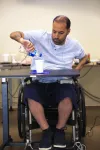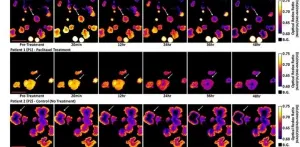(Press-News.org) Suppose you drop your morning coffee and it splatters everywhere. Later a colleague drops by to say hello. Do you grumble a testy acknowledgment, or cheerfully greet her?
In a new study on brain activity led by University of Miami psychologists, researchers found that how a person's brain evaluates fleeting negative stimuli--such as that dropped cup--may influence their long-term psychological well-being.
"One way to think about it is the longer your brain holds on to a negative event, or stimuli, the unhappier you report being," said Nikki Puccetti, a Ph.D. candidate in the Department of Psychology and lead author of the study published Monday in the Journal of Neuroscience. "Basically, we found that the persistence of a person's brain in holding on to a negative stimulus is what predicts more negative and less positive daily emotional experiences. That in turn predicts how well they think they're doing in their life."
"The majority of human neuroscience research looks at how intensely the brain reacts to negative stimuli, not how long the brain holds on to a stimulus,'' said Aaron Heller, senior author of the study and assistant professor of psychology. "We looked at the spillover--how the emotional coloring of an event spills over to other things that happen. Understanding the biological mechanisms of that is critically important to understanding the differences in brain function, daily emotions, and well-being," he added.
For their study, the researchers set out to learn how different reactions in the brain to emotional pictures relate to momentary emotional experiences in daily life and even psychological well-being over time. They hypothesized that the amygdala, the almond-shaped structure on both sides of the cerebrum that evaluates stimuli and supports emotion and memory, played an important role.
They confirmed their suspicions by analyzing data from the Midlife in the United States (MIDUS) study, one of the richest and most unique longitudinal studies on the health and well-being of thousands of adults as they age. Initiated by the National Institute on Aging in 1995, the study continued in 2002 at the University of Wisconsin-Madison, where Heller earned his Ph.D.
With other researchers affiliated with the MIDUS project, Puccetti and Heller analyzed data from 52 MIDUS participants who had completed a questionnaire about their psychological well-being and, in a nightly phone call, reported the stressful events and positive and negative emotions they had experienced each day for about a week. The study subjects also underwent functional magnetic resonance imaging (fMRI) scans that measured and mapped their brain activity as they viewed and rated 60 positive images and 60 negative images, interspersed with 60 images of neutral facial expressions.
Connecting data from the questionnaires, the daily phone diaries, and brain snapshots from the fMRIs, the researchers determined that people whose left amygdala held on to negative stimuli for fewer seconds were more likely to report more positive and fewer negative emotions in their daily lives--which spilled over to a more enduring well-being over time.
Conversely, people whose left amygdala reacted more persistently to negative images over time reported more negative and fewer positive emotions in their daily lives.
"It may be that for individuals with greater amygdala persistence, negative moments may become amplified or prolonged by imbuing unrelated moments that follow with a negative appraisal," the authors stated. "This brain-behavior link between left amygdala persistence and daily affect can inform our understanding of more enduring, long-term evaluations of well-being."
And it could explain, Puccetti said, why some people might let a dropped cup of coffee ruin their day, while others wouldn't give it another thought after cleaning the mess up. It's also why she hopes to one day repeat the study with subjects who, unlike the MIDUS participants, are at high risk for developing depression or anxiety.
"It might be the case that they're showing even greater persistence and that's something that can tell us about why they might be more likely to go on to develop a psychiatric disorder," Puccetti noted.
INFORMATION:
In addition to Puccetti and Heller, the co-authors on the study, "Linking amygdala persistence to real-world emotional experience and psychological well-being," included Stacey M. Schaefer, University of Wisconsin-Madison; Carien M. van Reekum, University of Reading; Anthony D. Ong, Cornell University; David M. Almeida, The Pennsylvania State University; and Carol D. Ryff and Richard J. Davidson, both with the University of Wisconsin-Madison.
East Hanover, NJ. March 22, 2021. Kessler Foundation researchers demonstrated that spinal cord transcutaneous stimulation (scTS) combined with hand training improves upper extremity and hand function in individuals with motor and sensory compete spinal cord injury (SCI). The study results showed immediate and long-lasting gains in strength, sensibility, and voluntary motor function.
The article, "Cervical Spinal Cord Transcutaneous Stimulation Improves Upper Extremity and Hand Function in People with Complete Tetraplegia: A Case Study" (doi: 10.1109/TNSRE.2020.3048592), was published January 28, 2021, in IEEE Transactions On Neural Systems And Rehabilitation Engineering. It is available open access at https://ieeexplore.ieee.org/document/9311628.
The authors are Fan Zhang, ...
What is happening in your brain as you are scrolling through this page? In other words, which areas of your brain are active, which neurons are talking to which others, and what signals are they sending to your muscles?
Mapping neural activity to corresponding behaviors is a major goal for neuroscientists developing brain-machine interfaces (BMIs): devices that read and interpret brain activity and transmit instructions to a computer or machine. Though this may seem like science fiction, existing BMIs can, for example, connect a paralyzed person with a robotic ...
The pandemic has exposed weaknesses in nursing homes, causing many families to rethink whether to keep an aging parent at home instead. Now a new study by UC San Francisco has found that many elderly Americans lack the basic self-care equipment that could enable them to live at home longer, postponing the need to move into residential care facilities.
In the study, researchers focused on three inexpensive, low-tech assistive devices: grab bars around the toilet and in the shower or tub area; a shower or tub seat; and a raised toilet or toilet seat. They identified approximately 2,600 seniors who were representative of Medicare recipients nationwide and were drawn from the National Health and Aging ...
Social deficits attract so much attention in the study of autism spectrum disorder, it's easy to forget there are motor learning deficits during early childhood as well. For autistic kids hoping to throw a ball around the schoolyard and connect with classmates, these physical skill differences can isolate a child further.
In a new study published in Nature Neuroscience, researchers from the University of Ottawa's Faculty of Medicine have closed in on the neurological underpinnings of the motor learning delay.
Dr. Simon Chen's lab in the Department of Cellular and Molecular Medicine of the Faculty of Medicine used a mouse model of autism to demonstrate a shortage ...
Though 40 million concussions are recorded annually, no effective treatment exists for them or for many other brain-related illnesses. In collaboration with Dragan Maric of the National Institutes of Health, Badri Roysam, Hugh Roy and Lillie Cranz Cullen University Professor and Chair of Electrical and Computer Engineering, and his team are working to speed up drug development to treat brain diseases and injuries like concussion by developing new tools.
"We are interested in mapping and profiling unhealthy and drug-treated brain tissue in unprecedented detail to reveal multiple biological processes at once - in context," said Roysam about his latest paper published ...
NEW YORK, NY (March 22, 2021)--The first year of the COVID-19 pandemic has taken the lives of millions of people around the world but has also left hundreds with lingering symptoms or completely new symptoms weeks after recovery.
Much is unknown about what causes these symptoms and how long they last. But with nearly 740,000 cases of COVID reported in New York City since last March--and 28 million in the United States--physicians are increasingly seeing these "long-haulers" in their practices.
"Over the course of the summer, we started getting a sense of what issues these people were having," ...
Organoids are tiny three-dimensional cellular assemblies that are grown in a laboratory from tissue-specific cells. They are particularly interesting to biologists because of their ability to mimic the characteristics of the original tissues. If scientists extract cells from a tumor, then they can grow cancer organoids that mimic the characteristics of the source tumor.
This possibility for individual-level studies of tumor properties makes cancer organoids an exciting tool from the perspective of an emerging field called precision cancer medicine. Daniel Gil of the University of Wisconsin ...
CLEVELAND--A new technique for sampling and testing cells from Barrett's esophagus (BE) patients could result in earlier and easier identification of patients whose disease has progressed toward cancer or whose disease is at high risk of progressing toward cancer, according to a collaborative study by investigators at Case Western Reserve University and Johns Hopkins Kimmel Cancer Center (JHKCC).
Published in the journal Gastroenterology, the findings show the combination of esophageal "brushing" with a massively parallel sequencing method can provide an accurate assessment of the ...
For something we spend one-third of our lives doing, we still understand remarkably little about how sleep works -- for example, why can some people sleep deeply through any disturbance, while others regularly toss and turn for hours each night? And why do we all seem to need a different amount of sleep to feel rested?
For decades, scientists have looked to the behavior of the brain's neurons to understand the nature of slumber. Now, though, researchers at UC San Francisco have confirmed that a different type of brain cell that has received far less study -- astrocytes, named for their star-like shape -- can influence how long and how deeply animals sleep. The findings could open new avenues for exploring sleep disorder therapies and help scientists better understand brain diseases linked ...
A large study of brain MRI scans from 11,679 nine- and ten-year-old children reviewed by UC San Francisco neuroradiologists identified potentially life-threatening conditions in 1 in 500 children, and more minor but possibly clinically significant brain abnormalities in 1 out of 25 children.
The results provide the best estimates to date of the true incidence of various structural abnormalities in the developing brain, and raise the question of whether all MRI brain imaging obtained during research studies should be reviewed by board-certified radiologists, as was done in this study, in the hopes of saving lives and alerting participants to incidental findings that ought to be medically evaluated.
One ...




